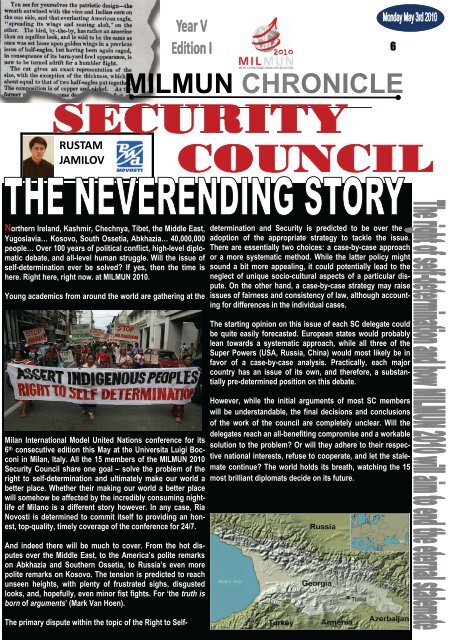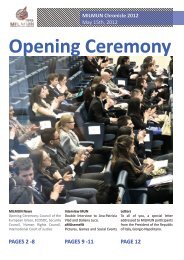Create successful ePaper yourself
Turn your PDF publications into a flip-book with our unique Google optimized e-Paper software.
<strong>MILMUN</strong> CHRONICLE<br />
6<br />
RUSTAM<br />
JAMILOV<br />
Northern Ireland, Kashmir, Chechnya, Tibet, the Middle East,<br />
Yugoslavia… Kosovo, South Ossetia, Abkhazia… 40,000,000<br />
people… Over 100 years of political conflict, high-level diplomatic<br />
debate, and all-level human struggle. Will the issue of<br />
self-determination ever be solved? If yes, then the time is<br />
here. Right here, right now. at <strong>MILMUN</strong> <strong>2010</strong>.<br />
Young academics from around the world are gathering at the<br />
Milan International Model United Nations conference for its<br />
6 th consecutive edition this <strong>May</strong> at the Universita Luigi Bocconi<br />
in Milan, Italy. All the 15 members of the <strong>MILMUN</strong> <strong>2010</strong><br />
Security Council share one goal – solve the problem of the<br />
right to self-determination and ultimately make our world a<br />
better place. Whether their making our world a better place<br />
will somehow be affected by the incredibly consuming nightlife<br />
of Milano is a different story however. In any case, Ria<br />
Novosti is determined to commit itself to providing an honest,<br />
top-quality, timely coverage of the conference for 24/7.<br />
And indeed there will be much to cover. From the hot disputes<br />
over the Middle East, to the America’s polite remarks<br />
on Abkhazia and Southern Ossetia, to Russia’s even more<br />
polite remarks on Kosovo. The tension is predicted to reach<br />
unseen heights, with plenty of frustrated sighs, disgusted<br />
looks, and, hopefully, even minor fist fights. For ‘the truth is<br />
born of arguments’ (Mark Van Hoen).<br />
The primary dispute within the topic of the Right to Self-<br />
determination and Security is predicted to be over the<br />
adoption of the appropriate strategy to tackle the issue.<br />
There are essentially two choices: a case-by-case approach<br />
or a more systematic method. While the latter policy might<br />
sound a bit more appealing, it could potentially lead to the<br />
neglect of unique socio-cultural aspects of a particular dispute.<br />
On the other hand, a case-by-case strategy may raise<br />
issues of fairness and consistency of law, although accounting<br />
for differences in the individual cases.<br />
The starting opinion on this issue of each SC delegate could<br />
be quite easily forecasted. European states would probably<br />
lean towards a systematic approach, while all three of the<br />
Super Powers (USA, Russia, China) would most likely be in<br />
favor of a case-by-case analysis. Practically, each major<br />
country has an issue of its own, and therefore, a substantially<br />
pre-determined position on this debate.<br />
However, while the initial arguments of most SC members<br />
will be understandable, the final decisions and conclusions<br />
of the work of the council are completely unclear. Will the<br />
delegates reach an all-benefiting compromise and a workable<br />
solution to the problem? Or will they adhere to their respective<br />
national interests, refuse to cooperate, and let the stalemate<br />
continue? The world holds its breath, watching the 15<br />
most brilliant diplomats decide on its future.



